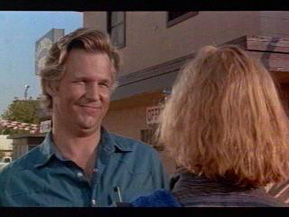|
|
Chapter Two: Texasville vs. The Evening StarBy Brett Ballard-BeachJuly 7, 2011
The film opens on the sight of a lonely satellite dish pointing off with a shrug to the skies and then slowly pans left to reveal Duane Jackson (Jeff Bridges), former football "star," homecoming king, and golden boy, with pistol in hand taking drunken pot shots at his dog’s absurdly oversized doghouse, from the comfort of his hot tub. Duane has a crumbling marriage, crumbled financial fortunes ($12 million in debts) and frayed family connections (he finds his teenage son is his greatest competition for the ladies in town). And this is all before his high school sweetheart, homecoming queen turned famous actress Jacy Farrow (Cybill Shepherd) returns to town following the death of her son and parents. Texasville follows their relationship, that of Jacy’s with Duane’s wife Karla (Annie Potts), and the climate of the town in general as it prepares to celebrate it’s centennial over Labor Day. Like many elements of the past in Texasville, the death of Jacy’s son lingers there in the air, but isn’t discussed and dissected. Texasville is ultimately about healing and moving on from the past, but I don’t want to oversell the pathos. Texasville is more frequently than not bawdy, vulgar, larger than life and, like the apple that Jacy bites into as she and Duane do an Adam and Eve skit at the centennial, pretty damn sweet.
|

|
|
|

|
Sunday, May 5, 2024
© 2024 Box Office Prophets, a division of One Of Us, Inc.


